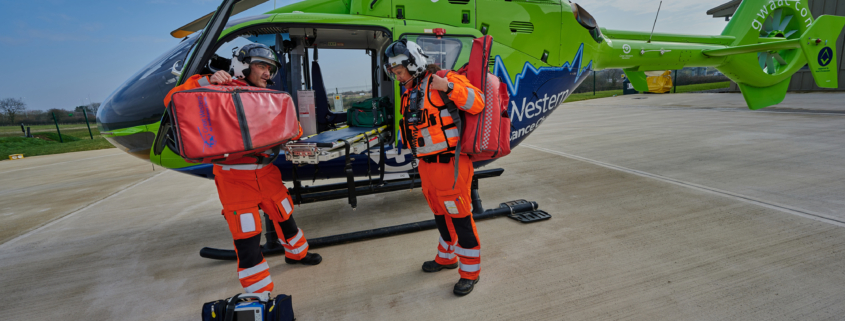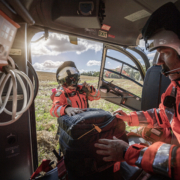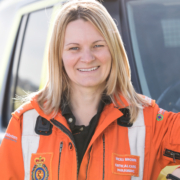New kit for GWAAC is helping to save lives
Great Western Air Ambulance Charity (GWAAC) added a new and advanced piece of lifesaving equipment to their kit in 2021 — an arterial line for blood pressure monitoring. And patients are already beginning to benefit from this new procedure.
Unlike the usual method of blood pressure monitoring which uses a cuff on the patient’s arm, the arterial line is inserted into the artery. It is attached to a device that lets the GWAAC crew measure blood pressure continuously, instead of every two minutes like the cuff method. Advantages include:
- Instant information on a patient’s blood pressure
- Ability to tailor treatment to improve a patient’s condition
- A faster response to a patient’s changing condition
The use of the arterial line for blood pressure monitoring in a pre-hospital setting means a greater chance of survival and onward recovery for the patient.
This advanced blood pressure monitoring equipment is not carried on standard land ambulances and is usually restricted to hospital use. The fact that GWAAC’s crew carries such specialist equipment in our helicopter and rapid response cars, means that they can deliver this hospital-level care instantly at the roadside.
GWAAC’S Critical Care Doctor, Matt Thomas, whose specialty is intensive care, says,
“Invasive blood pressure monitoring is common practice in intensive care and I’m confident that its use in the pre-hospital environment will be beneficial to patients.”
GWAAC’s first patient to receive the arterial line blood pressure monitoring was a Gloucestershire man suffering a cardiac arrest in the autumn of last year. His survival and recovery were aided by the use of arterial line blood pressure monitoring.
On speaking about the patient, Dr Thomas said:
“The patient was lucky that he had immediate CPR from bystanders then excellent care from South Western Ambulance Service before we arrived. We were fortunate to be able to land close by which saved time. The patient’s blood pressure needed to be managed carefully. After a cardiac arrest, it is vital that we keep a patient’s blood pressure stable using powerful medications only carried by Critical Care Teams. The arterial lines and blood pressure monitoring significantly improves our accuracy in using these drugs. I use the arterial line daily on my intensive care unit so am confident its pre-hospital use will hugely improve patient care.”
Life-threatening cardiac arrests continue to be the most common medical incident to which the crew is tasked. GWAAC responded to over 500 patients experiencing this medical emergency in 2021. The need for arterial line blood pressure monitoring also arises from trauma-related incidents, such as a head injury.
Anna Perry, CEO, Great Western Air Ambulance Charity, says:
“It’s only with the kind donations of supporters that GWAAC continues to do all we can for patients needing our care. This includes improving treatments to give patients the best chance of survival and long-term recovery. The introduction of arterial line blood pressure monitoring is already improving the outcomes for our patients.”





